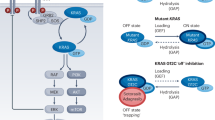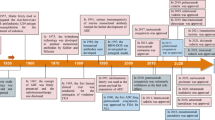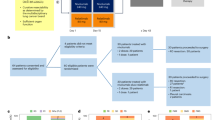Abstract
Treatment of EGFR-mutant non-small cell lung cancer (NSCLC) with mutation-selective third-generation EGFR-tyrosine kinase inhibitors (EGFR-TKIs) such as osimertinib has achieved remarkable success in the clinic. However, the immediate challenge is the emergence of acquired resistance, limiting the long-term remission of patients. This study suggests a novel strategy to overcome acquired resistance to osimertinib and other third-generation EGFR-TKIs through directly targeting the intrinsic apoptotic pathway. We found that osimertinib, when combined with Mcl-1 inhibition or Bax activation, synergistically decreased the survival of different osimertinib-resistant cell lines, enhanced the induction of intrinsic apoptosis, and inhibited the growth of osimertinib-resistant tumor in vivo. Interestingly, the triple-combination of osimertinib with Mcl-1 inhibition and Bax activation exhibited the most potent activity in decreasing the survival and inducing apoptosis of osimertinib-resistant cells and in suppressing the growth of osimertinib-resistant tumors. These effects were associated with increased activation of the intrinsic apoptotic pathway evidenced by augmented mitochondrial cytochrome C and Smac release. Hence, this study convincingly demonstrates a novel strategy for overcoming acquired resistance to osimertinib and other 3rd generation EGFR-TKIs by targeting activation of the intrinsic apoptotic pathway through Mcl-1 inhibition, Bax activation or both, warranting further clinical validation of this strategy.
This is a preview of subscription content, access via your institution
Access options
Subscribe to this journal
Receive 50 print issues and online access
$259.00 per year
only $5.18 per issue
Buy this article
- Purchase on Springer Link
- Instant access to full article PDF
Prices may be subject to local taxes which are calculated during checkout







Similar content being viewed by others
References
Sung H, Ferlay J, Siegel RL, Laversanne M, Soerjomataram I, Jemal A, et al. Global cancer statistics 2020: GLOBOCAN estimates of incidence and mortality worldwide for 36 cancers in 185 countries. CA Cancer J Clin. 2021;71:209–49.
Shah R, Lester JF. Tyrosine kinase inhibitors for the treatment of EGFR mutation-positive non-small-cell lung cancer: a clash of the generations. Clin Lung Cancer. 2020;21:e216–e228.
Carlisle JW, Ramalingam SS. Role of osimertinib in the treatment of EGFR-mutation positive non-small-cell lung cancer. Future Oncol. 2019;15:805–16.
Piper-Vallillo AJ, Sequist LV, Piotrowska Z. Emerging treatment paradigms for EGFR-mutant lung cancers progressing on osimertinib: a review. J Clin Oncol. 2020;38:2926–36.
Ramalingam SS, Vansteenkiste J, Planchard D, Cho BC, Gray JE, Ohe Y, et al. Overall survival with osimertinib in untreated, EGFR-mutated advanced NSCLC. N Engl J Med. 2020;382:41–50.
Soria JC, Ohe Y, Vansteenkiste J, Reungwetwattana T, Chewaskulyong B, Lee KH et al. Osimertinib in untreated EGFR-mutated advanced non-small-cell lung cancer. N Engl J Med. 2017;378:113–25.
Leonetti A, Sharma S, Minari R, Perego P, Giovannetti E, Tiseo M. Resistance mechanisms to osimertinib in EGFR-mutated non-small cell lung cancer. Br J Cancer. 2019;121:725–37.
Negi A, Murphy PV. Development of Mcl-1 inhibitors for cancer therapy. Eur J medicinal Chem. 2021;210:113038.
Wang H, Guo M, Wei H, Chen Y. Targeting MCL-1 in cancer: current status and perspectives. J Hematol Oncol. 2021;14:67.
Shi P, Oh YT, Deng L, Zhang G, Qian G, Zhang S, et al. Overcoming acquired resistance to AZD9291, a third-generation EGFR inhibitor, through modulation of MEK/ERK-dependent Bim and Mcl-1 degradation. Clin Cancer Res. 2017;23:6567–79.
Walensky LD. Targeting BAX to drug death directly. Nat Chem Biol. 2019;15:657–65.
Pogmore JP, Uehling D, Andrews DW. Pharmacological targeting of executioner proteins: controlling life and death. J Med Chem. 2021;64:5276–90.
Xin M, Li R, Xie M, Park D, Owonikoko TK, Sica GL, et al. Small-molecule Bax agonists for cancer therapy. Nat Commun. 2014;5:4935.
Li R, Ding C, Zhang J, Xie M, Park D, Ding Y, et al. Modulation of Bax and mTOR for cancer therapeutics. Cancer Res. 2017;77:3001–12.
Zang H, Qian G, Zong D, Fan S, Owonikoko TK, Ramalingam SS, et al. Overcoming acquired resistance of epidermal growth factor receptor-mutant non-small cell lung cancer cells to osimertinib by combining osimertinib with the histone deacetylase inhibitor panobinostat (LBH589). Cancer. 2020;126:2024–33.
Cotter TG. Apoptosis and cancer: the genesis of a research field. Nat Rev Cancer. 2009;9:501–7.
Fesik SW. Promoting apoptosis as a strategy for cancer drug discovery. Nat Rev Cancer. 2005;5:876–85.
Zimmermann KC, Green DR. How cells die: apoptosis pathways. J Allergy Clin Immunol. 2001;108:S99–103.
Fulda S. Apoptosis pathways and their therapeutic exploitation in pancreatic cancer. J Cell Mol Med. 2009;13:1221–7.
Penn LZ. Apoptosis modulators as cancer therapeutics. Curr Opin Investig Drugs. 2001;2:684–92.
Rowinsky EK. Targeted induction of apoptosis in cancer management: the emerging role of tumor necrosis factor-related apoptosis-inducing ligand receptor activating agents. J Clin Oncol. 2005;23:9394–407.
Schulze-Bergkamen H, Krammer PH. Apoptosis in cancer-implications for therapy. Semin Oncol. 2004;31:90–119.
Sun SY, Hail N Jr, Lotan R. Apoptosis as a novel target for cancer chemoprevention. J Natl Cancer Inst. 2004;96:662–72.
Zhang L, Lu Z, Zhao X. Targeting Bcl-2 for cancer therapy. Biochim Biophys Acta Rev Cancer. 2021;1876:188569.
Shi P, Oh YT, Zhang G, Yao W, Yue P, Li Y, et al. Met gene amplification and protein hyperactivation is a mechanism of resistance to both first and third generation EGFR inhibitors in lung cancer treatment. Cancer Lett. 2016;380:494–504.
Sun SY, Yue P, Dawson MI, Shroot B, Michel S, Lamph WW, et al. Differential effects of synthetic nuclear retinoid receptor-selective retinoids on the growth of human non-small cell lung carcinoma cells. Cancer Res. 1997;57:4931–9.
Zong D, Gu J, Cavalcante GC, Yao W, Zhang G, Wang S, et al. BRD4 levels determine the response of human lung cancer cells to BET degraders that potently induce apoptosis through suppression of Mcl-1. Cancer Res. 2020;80:2380–93.
Hasenjager A, Gillissen B, Muller A, Normand G, Hemmati PG, Schuler M, et al. Smac induces cytochrome c release and apoptosis independently from Bax/Bcl-x(L) in a strictly caspase-3-dependent manner in human carcinoma cells. Oncogene. 2004;23:4523–35.
Acknowledgements
We thank Dr. A. Hammond in our department for editing the manuscript. This work was supported by Emory University Winship Cancer Institute lung cancer pilot fund (to SYS), NIH/NCI SPORE P50 CA217691 (to XD) and a research fund from Ascentage Pharma (to SYS). TKO, SSR and SYS are Georgia Research Alliance Distinguished Cancer Scientists.
Author information
Authors and Affiliations
Contributions
Conceptualization: GM, XD, TKO, SSR, DDF, YZ, and S-YS. Investigation: GM, YD, LQ, KAV, and GZ. Methodology: GM, YD, LQ, KAV, GZ and S-YS. Writing/Original Draft: GM, and S-YS. Review/Editing: YD, LQ, KAV, GZ, XD, TKO, SSR, DDF, and YZ. Funding Acquisition: SSR, XD, DDF, YZ and S-YS. Supervision: XD, YZ, and S-YS.
Corresponding author
Ethics declarations
Competing interests
TKO is on consulting/advisory board for Novartis, Celgene, Lilly, Sandoz, Abbvie, Eisai, Takeda, Bristol-Myers Squibb, MedImmune, Amgen, AstraZeneca and Boehringer Ingelheim. SSR is on consulting/advisory board for AstraZeneca, BMS, Merck, Roche, Tesaro and Amgen. YZ and DDF are full-time employees and equity shareholders of Ascentage Pharma. SYS received a research fund from Ascentage Pharma. Other authors disclose that they have no potential conflicts of interest.
Additional information
Publisher’s note Springer Nature remains neutral with regard to jurisdictional claims in published maps and institutional affiliations.
Rights and permissions
About this article
Cite this article
Ma, G., Deng, Y., Qian, L. et al. Overcoming acquired resistance to third-generation EGFR inhibitors by targeting activation of intrinsic apoptotic pathway through Mcl-1 inhibition, Bax activation, or both. Oncogene 41, 1691–1700 (2022). https://doi.org/10.1038/s41388-022-02200-5
Received:
Revised:
Accepted:
Published:
Issue Date:
DOI: https://doi.org/10.1038/s41388-022-02200-5
This article is cited by
-
Single cell lineage tracing reveals clonal dynamics of anti-EGFR therapy resistance in triple negative breast cancer
Genome Medicine (2024)
-
Downregulation of Linc00173 increases BCL2 mRNA stability via the miR-1275/PROCA1/ZFP36L2 axis and induces acquired cisplatin resistance of lung adenocarcinoma
Journal of Experimental & Clinical Cancer Research (2023)
-
Protein tyrosine kinase inhibitor resistance in malignant tumors: molecular mechanisms and future perspective
Signal Transduction and Targeted Therapy (2022)
-
Targeting apoptosis to manage acquired resistance to third generation EGFR inhibitors
Frontiers of Medicine (2022)



